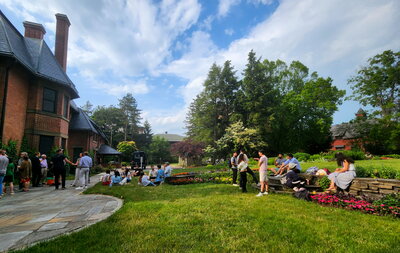
Unit for Criticism SCT Fellow, Summer 2023
Depsychologization and panpsychism are two terms that I learned from my seminar at Cornell’s School of Criticism and Theory (SCT), which aptly portray my experience amid the gorges of Ithaca, New York. Depsychologization was the process that partly erased, reformed, and reinstituted my academic thoughts and scholarship. It was a panpsychism, where I tried to embrace the new environment and engage in intense discourses with my innermost consciousness. In the welcome reception, Professor Hent de Vries, the director of SCT, warned us that we would be going through an “avalanche of knowledge,” which turned out to be very much the truth.
For my seminar, I had chosen Professor Sandra Laugier’s “Concept of the Ordinary.” Deviating from many other topics and seminars offered in prior years, I presumed this topic to be closely related to my own dissertation, which deals with power, class, people, the vernacular, and parallel modernist spectacles. Thus, with Laugier’s ordinary language philosophy, the “de-psychologizing” process began.
Although we were immersed in her three-hour lessons twice a week, most of the time the class meeting stretched beyond. We had to prepare for these sessions. We dived into the texts of Ludwig Wittgenstein, J. L. Austin, and Stanley Cavell. Wittgenstein’s early ideas about the philosophy of mind swiftly redirected us to the philosophy of language. This process focused on how we use language, how our world and worldviews are built and curated by language, and how meaning is always borne by specific contexts. As we communicate and do things with language, things are also, through language, done upon us. With that, “philosophy as a way of life” (a suggested book) became quite literal.
In addition to these classes, Laugier’s philosophical ideas needed to be supported by visual media. So, we routinely watched films and TV shows as case studies on Fridays. Some of the films we watched include Philadelphia Story, It Happened One Night, My Best Friend’s Wedding, Gaslight, The Wire, and Maid. These movie sessions were also followed by seminar-like conversations.
As the six weeks were filled with public lectures, other SCT faculty colloquia, and book ideas and talks, I tried to attend all events. Following the first guest lecturer and SCT Cornell’s Senior Fellow Amanda Anderson, I started my expedition from ground zero and engrossed myself in the program in every possible way. On alternate days we had mini-seminars with opportunities for individuals to talk to the faculty. The topics in these lectures and sessions went from classical philosophy of Plato and Aristotle to modern-day liberalism, democracy, theocracy, and current topics on race, gender, and collective trauma. These topics were regularly speckled by the theoretical premise of Kant, Emerson, Thoreau, Foucault, and Derrida.
This massive weigh of scholarship was equitably balanced by after-lecture refreshments, BBQ and garden parties, drinks, food, and laughter. Both De Vries and SCT-2023 organizer Carla Liesching emphatically described us an exceptionally friendly, helpful, and smart group, with camaraderie from a diverse background that surpassed the experience of prior years. There were students, professionals, and academics from 15 or more different countries that formed this uniquely congenial SCT-2023 group of 75. The academic branches of these participants ranged from philosophy, political science, language and literary studies, comparative religion and religious studies, sociology, and English to STEM (science, technology, engineering, and mathematics) fields like Landscape and Architecture, which is my field.
Amid this amicable cluster, what became crucial for me to sustain in the intense academic program was my newly formed friendships with many fellow attendees, particularly with my Illinois cohorts Mona Khneisser and Lara Weber (a transfer student at UIUC). These new associates, whom I never knew before my Cornell stay, not only enriched my intellectual experience but also helped me shed a few pounds and gain a few life years in the cascading landscape of therapeutic Ithaca. We had long walks to various gorges, Cornell’s very own botanical garden and arboretum, Ithaca Commons, parks (mainly Stewart Park), and dams. Occasionally we also went to Reggae concerts as well as gained different culinary experiences at local restaurants and cafes, which offered great food, which is often unusual in small towns. In that regard, Westy, the bar on West Seneca and Franco Pizza next door, became the group’s favorite spot where spent hours hopping between these two in the last two weeks. Small cookouts and indoor picnics also helped us sustain the academic journey in the new home away from home. Some of our cohorts continued SCT beyond Cornell and met in large groups in New York City and Austin, Texas. We, the Canadian SCT Fellows, also intend to do the same and continue our well-grounded amity.
Having a family with two little ones, attending SCT at Cornell was far from my academic plans and goals for a long time. However, in this last phase of my PhD journey in Illinois, I took it as a personal challenge to win the Nicholson Fellowship and participate in SCT-2023. I saw it as my last chance as a student to gain an exceptional and rich experience that I could not let go of. My planning struggles and shot in the dark were completely worthwhile. Being chosen by Professor De Vries to give a toast for our seminar at the SCT-2023 banquet and completion ceremony at Cornell was an extra honor that I will cherish for life. My Cornell experience will be unwaveringly invaluable to my future academic journey. Therefore, I am indebted to Illinois’s Unit for Criticism and Interpretive Theory for awarding me the Nicholson Fellowship, which was my sole means of being there. Now, I have a fresh way to see my own research and my future scholarly drive.
